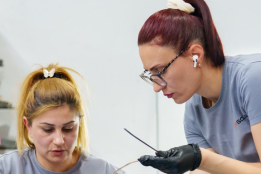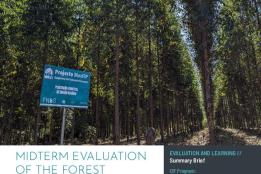Tropical rain gushes through pipes into the kitchen water tank. Grey rice cooks on an open fire radiating light in the dark room. Abah Haji Dulhani, the traditional chief of the ‘Adat’, or Indigenous community of Cibarani, in Indonesia’s Banten region, is seated on the floor, eating a durian freshly picked from the surrounding forest. By the door, a placid duck and a flock of chickens wait patiently, hoping to grab crumbs from the morning meal. On this rainy day in March 2024, only motorbikes can navigate the steep, rough forest tracks.
Cibarani’s Adat forest covers almost 500 hectares of wilderness adjacent to Mount Halimun Salak National Park, just a few hours from Indonesia’s capital city, Jakarta. The Kasepuhan people of Cibarani are entitled by the Government of Indonesia to freely access the forest that sustains them. In return, they look after this precious ecosystem on behalf of humanity.
But things were not always so harmonious. Cibarani’s territory used to be designated a ‘state forest’, and locals were scared to enter, even to perform traditional religious ceremonies. They had to pay to harvest durians, bananas, sugar, cocoa, or coffee from the forest. They also worried that the land could be turned over to a commodities company as a concession, for example to harvest timber or grow palm oil.
With support from the Climate Investment Funds’ (CIF) Dedicated Grant Mechanism for Indigenous peoples and local communities (DGM) and the World Bank, Cibarani obtained in January 2021 the official Adat designation, with a decree handed over by President Joko Widodo. This was a game changer for the village’s 700 households - and the local ecosystem. “We see so many improvements - for example, in terms of the security and the safety of our community. Before, we had so many conflicts,” explains Abah Haji Dulhani. “And we are sovereign in terms of food. In this region we say: the forest is green; the people are eating.”
On top of support to secure land rights, Indonesia’s Dedicated Grant Mechanism team partnered with the community to train villagers on growing a variety of garden vegetables. “We no longer need to go all the way to the market to buy vegetables like tomatoes,” explains Ibu Haji Fatmawati, the leader of one of Cabarani’s women groups. The village is self-sufficient, even feeding surrounding communities. This is made possible by the vegetable gardens, but also fertile rice paddies that are farmed sustainably, using ancestral methods with organic fertilizers and a rare species of local grey rice.
The villagers fully recognize that this resilience is linked to the pristine nature that surrounds them. “The forest can keep giving the benefits for the people and for the better good of this community,” says Ibu Haji Fatmawati.
Ibu Haji’s neighbors, female entrepreneurs Ibu Nita and Ibu Imas Fauziyah have created their own business, linking their commercial success with the health of the forest: they sell sugar harvested as sap on palm trees, crystalized and packaged. “I believe women should be independent and have our own livelihoods,” says Ibu Imas Fauziyah with a determined gaze. The women's group has received training to make higher value sap sugar and enhance their livelihoods
With land rights, improved livelihoods and women empowerment, Cibarani is moving ahead. Their success is just one of many obtained by DGM and CIF’s Forest Investment program in Indonesia. According to DGM Global, between 2017 and 2022, DGM Indonesia has “made important gains in helping participating Indigenous Peoples and Local Communities gain stronger recognition of tenure rights.” The reach of the program extends from Sumatra to New Guinea, with 63 subprojects across seven regions. In total, 11,000 Indonesians benefitted from improved livelihoods with DGM. And the program accomplished enhanced participation in REDD+ for Indigenous Peoples and Local Communities, ensuring sustainability through capacity building.




